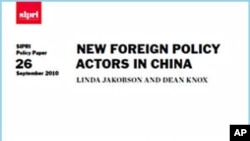A lack of transparency in China has long challenged analysts trying to understand the Chinese government's foreign policy decisions. A new report says Chinese leaders are increasingly influenced by a wide range of factors – from government agencies to research institutions and opinions voiced on the Internet.
Factors
As China's international influence grows, bolstered by its economic might, researchers at the Stockholm International Peace Research Institute, or SIPRI, say a growing number of players – from high ranking government officials and military officers to intellectuals, researchers, businessman and the media – are increasingly competing to influence the decisions of the country's top leaders.
Actors
Linda Jakobson heads SIPRI's China department and is one of the authors of the report "New Foreign Policy Actors in China."
"It's no longer possible to think about China's decision makers as a unitary force on any given foreign policy issue," Jakobson said. "Those seeking China's cooperation need to evaluate a whole host of potential interests from various interest groups. It's also, I think, critical to take into consideration this nationalist undercurrent running throughout China and the possible constraining effect that this has on leaders and their room for maneuver, especially during a crisis. "
Analysis
The report is based on 71 interviews, including 19 with officials of the Communist Party of China as well as interviews with officers from China's People's Liberation Army, or PLA, researchers, representatives of state-owned companies, journalists, bloggers and China analysts.
Speaking recently at a gathering in Washington D.C. to mark the release of the report, Jakobson said that many of those interviewed saw China's Foreign Ministry as a weak actor. She also noted the increasing influence of government agencies directly tied to the country's economy.
Jakobson said that as China's share of the global economy grows and domestic considerations increasingly have foreign policy ramifications, more government agencies and offices of the Communist Party will compete to influence decision making.
"This means that decisions, even by the lesser ministries, so to speak, will have an impact on country's both near and far," she said.
Internal and external infuence
Beyond the official Chinese establishment, Jakobson says local governments with international economic ties, researchers, media figures and people on the Internet also are actively trying to influence Beijing's foreign policy.
And there are those actors, such as large enterprises, Jakobson says, that do not necessarily seek to influence foreign policy, but ultimately do, often complicating Chinese diplomacy.
She says that in their pursuit of commerce these enterprises inadvertently entangle foreign policy officials in human rights, energy security and political issues.
"Ironically, of the various peripheral groups that the SIPRI report identifies, it's these enterprises that at times affect foreign policy the most as has been the case recently in Central Asia, Iran and Sudan," said Jakobson.
Role of China's People's Liberation Army
Jakobson notes that the influence of China's PLA and the Ministry of State Security is also growing.
"Several SIPRI interviewees said that the Beijing Olympics and then the riots last year in Xinjiang in the summer have led to more funds and prestige for the Ministry of State Security, thereby making it an increasingly powerful domestic actor whose sway spills over into the foreign policy realm," she said.
Jakobson says PLA officers increasingly are weighing in on public debates. She notes that PLA officers attend civilian workshops, invite Chinese and foreign civilian researchers to their own workshops and take part in televised debates about foreign policy.
"The PLA certainly no longer shies away from displaying its power as is evident from numerous incidents and also the 2007 anti-satellite test," Jakobson said. "And these were actions that the Chinese knew quite well would antagonize both the United States and its neighbors."
Viewpoint
David Finkelstein, director of China Studies at the Center for Naval Analyses here in Washington says China's military is finding an expanded role in influencing foreign policy because the country's security needs are growing.
"The PLA is increasingly involved in activities that have foreign policy and security policy implications," Finkelstein said. "Activities that require coordination and consultation across the party state – more than at any time in its history – the PLA is going places and doing things."
Finkelstein notes that during the past decade, the PLA's activities beyond China's borders have seen enormous growth from U.N. peacekeeping operations to exercises with foreign militaries as well as humanitarian assistance and disaster relief.












